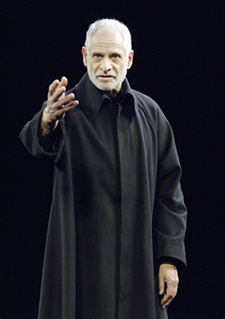HotReview.org Editor's
Picks
Shows Worth Seeing:

The Grand Inquisitor
By Fyodor Dostoyevsky
Adapted by Marie-Helene Estienne
New York Theater Workshop
74 E. 4th St.
The section of Dostoyevsky’s The Brothers Karamazov known as “The Grand Inquisitor” is a magnificent prose-poem recited by one brother to another as a sort of plea for help in resolving a spiritual crisis. The poem tells a story about Christ’s return to Earth as a man during the worst mass purges of the Spanish Inquisition. Seeing him working miracles and spreading his aura of love, the Grand Inquisitor has Christ arrested and thrown in prison. The Inquisitor doesn't fear Christ but rather chides him for “disturbing” the necessary work of terror, explaining in a long monologue that humanity long ago proved itself too weak and corrupt to handle the free moral choice with which Christ had burdened them. They need the Inquisition, a cynical and pragmatic institution working in cooperation with the anti-Christ, to have any hope of achieving happiness.
Peter Brook has turned this episode into a short, spare and powerful theater piece starring the actor Bruce Myers, his longtime collaborator. Myers delivers the text as a monologue to another actor (Jake M. Smith), who sits listening in silence. Myers’s Inquisitor speaks firmly and mellifluously with assured calm, yet after a while the sheer length of his monologue, along with the resolute and peaceful silence of his partner, suggest that he is the weaker party regardless of his earthly power. Taking the story out of context has its costs: the audience never hears the brother’s response to it, for instance, and never learns what becomes of the self-destructively intellectual teller. The gain, however, is that the contemporary resonances shine through with dreadful clarity. The deep cynicism and spiritual confusion of our historical moment make the text seem like it was written last week rather than nearly 130 years ago. Onstage, the theocratic absolutism of the Inquisitor becomes a trope for all decisions human beings make, usually in fear, to exchange freedom for the illusion of security.
